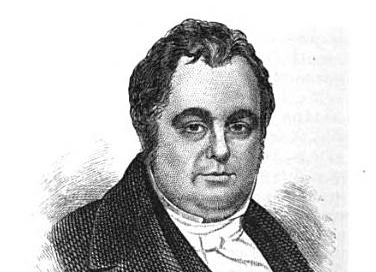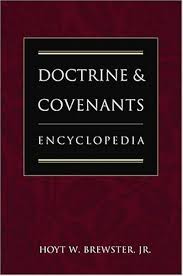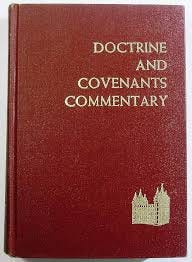Lessons from the Life of James Covel
Reflections on Doctrine and Covenants 39 and 40
On January 5, 1831, through the Prophet Joseph Smith, the Lord revealed to James Covel (and about James Covel) what are now Doctrine and Covenants 39 and 40.
Who was James Covel? (see also here, here, and here)
(ca. 1770–1850)
James Covel was likely born in Massachusetts. During the 1790s, he served as a Methodist itinerant preacher in Connecticut, New York, and Massachusetts. He married Sarah Gould in 1795. After living in Massachusetts, Maine, and other areas of New York state, he moved to New York City sometime before July 1822. By 1830, he was living in Canadice Township, New York, and that same year he was elected president of the Rochester Conference of Methodist Society. In January 1831, Joseph Smith received a revelation that commanded Covel to be baptized into The Church of Jesus Christ of Latter-day Saints (Doctrine and Covenants 39:10). However, Covel decided against baptism (Doctrine and Covenants 40).
Covel had been a Methodist minister for about forty years when he attended a conference of Latter-day Saints in Fayette, New York in early January 1831. He was so impressed with the doctrine of the Church that he covenanted to obey any command the Lord gave him through the Prophet Joseph Smith. In the chapter “James Covel and the ‘Cares of the World’,” in Revelations in Context, we learn more about this story:
Of all the parables of Jesus, none illustrates the precariousness of Christian discipleship more powerfully than the parable of the sower (see Matthew 13:3–23). All the seeds in the story start out with great potential for growth, but not all are planted in soil nourishing enough to develop that potential. Seeds that fall into good ground get the nutrients required to develop a deep and extensive root system and thus push aside threats to their growth. Other seeds are not so fortunate. Some fall by the wayside; God’s word is never truly understood, and the wicked one snatches the seeds away. Still others fall on stony ground and, lacking adequate roots, wither in the scorching sun of tribulation. Finally, other seeds fall among thorns. Jesus likens the plight of these seeds to those who hear the word but are choked by the deceitfulness of riches and the “care of this world” (Matthew 13:22).
Doctrine and Covenants 39 and 40 mirror the language of this parable in the telling of the story of James Covel, a Methodist minister who showed intense but fleeting interest in the Church. Covel, like the seeds in the story, started out with great potential. Born the son of a Baptist-minister father and a Methodist mother in Chatham, Massachusetts, in about 1770, Covel became an itinerant preacher in the Methodist Episcopal Church in 1791. He traveled the circuit in and around Litchfield, Connecticut, and eventually married and settled in Poughkeepsie, New York.1
Covel was recognized in Methodist circles as a steady and reliable man. By the 1820s, he had become a leader in the Methodist reform movement. (The reformed Methodists arose to contest the worldliness they saw entering their church when mainstream Methodism started to abandon the exercise of spiritual gifts.) Before joining the Latter-day Saints, Brigham Young, Wilford Woodruff, and John Taylor, among others, saw themselves as reformed Methodists. In 1826, Covel was named president of the New York Conference of the Methodist Society, a group of dissenting Methodists who brought together a number of small offshoots. He later served as book agent in New York City for the literature published by reformers in the movement.
Covel was preaching in the Richmond circuit, 45 miles east of Fayette, New York, when he attended a conference of Latter-day Saints at Fayette in early January 1831. The Church was on its way out of New York then, the call to settle in Ohio having already come through revelation (see D&C 37:3).
Covel was more impressed with the teachings of the Church than with the call to move. In fact, he seemed poised to convert. He lingered a few days, talking with Church leaders, and covenanted with God to obey the call to repent and be baptized.2
On January 5, 1831, a revelation came through Joseph Smith, calling Covel to join the Saints in their move to Ohio. “Thou art called to Labour in my Vineyard & to build up my Church,” the revelation said.3 Such language would have comforted any Methodist preacher, but the next verse was troubling: “Verily I say unto you thou art not called to go unto the Eastern countries but thou art called to go to Ohio.”4 For 40 years, Covel had preached east of upstate New York. Now he was being asked to go the opposite direction to preach.
The January 5 revelation warned Covel that in times past he had rejected the Lord. Like the seed that falls among thorns, Covel had let “the cares of the world” choke the seed the Lord had wanted to plant.5
Covel must have known that moving west would mean cutting ties with the deep and extensive associations he had built up over his career. Two of his sons were Methodist preachers, and his years spent working in New York City had put him in contact with the movement’s most powerful voices. All the prestige he had accumulated over the course of a lifetime would have to be abandoned. It took Covel less than 48 hours to decide that he would not move to Ohio. A follow-up revelation made clear that Covel had rejected the Lord’s call: Covel, it said, “Received the word with Gladness but Straitway Satan came & tempted him & the fear of persecution & the cares of the world caused him to reject the word.”6
After his fleeting interest in the Church, Covel returned to his former position. He preached and gained converts for Methodism in upstate New York until 1836, when he moved back to New York City. He remained there until his death in February 1850. By then the Saints had moved still farther west, beyond the Rocky Mountains to the arid Great Basin.
Hoyt W. Brewster, Jr.’s brief entry on Covill, James in his Doctrine & Covenants Encyclopedia also provides a good summary of the background for these revelations:
Of the 136 sections of the Doctrine and Covenants, two are given specifically to James Covill (39, 40). He “had been a Baptist minister for about forty years, and covenanted with the Lord that he would obey any command that the Lord would give to him through the Prophet Joseph (HC 1:143). The Lord indicated his pleasure with the sate of Covill’s heart at that time and reminded Covill that he had previously rejected the Lord “many times because of the pride and the cares of the world” (D&C 39:8-9). Although the revelation was received “with gladness, … straightway Satan tempted him; and the fear of persecution and the cares of the world caused him to reject the word” (D&C 40:2).
The story of James Covill provides a tragic example of one who foolishly sought fleeting fellowship with the world at the expense of the constant companionship of the Spirit of God. “And the world passeth away, and the lust thereof; but he that doeth the will of God abideth for ever” (1 John 2:17). (p. 109)
What were the Lord’s revelations to and about James Covel (Covill), and what lessons do we learn from them? Let’s examine them a piece at a time:
Hearken and listen to the voice of him who is from all eternity to all eternity, the Great I Am, even Jesus Christ—
The light and the life of the world; a light which shineth in darkness and the darkness comprehendeth it not;
The same which came in the meridian of time unto mine own, and mine own received me not;
But to as many as received me, gave I power to become my sons; and even so will I give unto as many as will receive me, power to become my sons.
And verily, verily, I say unto you, he that receiveth my gospel receiveth me; and he that receiveth not my gospel receiveth not me. (D&C 39:1-5)
Once again, the Lord gives a similar introduction and then reveals new insights about His character and mission. As important as each revelation on a particular topic or to a particular person may be, these introductions indicate to me that it is even more important for the Lord to reveal truths about Himself. He is the source of truth. Indeed, He is the Truth. He is the source of the revelations, and He wants us to know Him just as much as He wants us to understand His word.
Jesus Christ came unto His own people, the Jews, in the meridian of time, but they rejected Him. Those who received Him also received power from Him to become His sons. We receive Jesus Christ when we receive His Gospel.
What does it mean to receive the Gospel of Jesus Christ?
In simple terms, I believe that it means that we obey the Gospel of Jesus Christ: we exercise faith in Christ, repent, are baptized, receive the Holy Ghost, and endure to the end. As we consistently do these things we receive Jesus Christ, and thereby we receive power to become His sons and daughters.
The Lord Himself then taught James Covel (and us) His Gospel:
And this is my gospel—repentance and baptism by water, and then cometh the baptism of fire and the Holy Ghost, even the Comforter, which showeth all things, and teacheth the peaceable things of the kingdom. (D&C 39:6)
Smith and Sjodahl observe the following in relation to this verse:
This is my gospel] Mr. Covill was a Baptist. The Baptists are a rather venerable sect, in point of age. In the early days of ecclesiastical history there were many who protested against the changing of the ordinances, and the worldliness of the church. In Africa the Donatists refused to accept as valid the ordinances performed by the dominant church. In England Britons refused to “perform the office of baptizing according to the custom of the holy Roman church” (The Venerable Bede, in the year 731). Later, Waldenses, Albigenses, Petrobrusians, and others contended for baptism for believers. The Anabaptists at the time of the Reformation were the descendants of sects which had taught baptism by immersion. In Holland they were called Mennonites, after Menno Simonis; in England, Baptists. They believe in baptism by immersion after a confession of belief in our Lord and repentance of past sins. To them baptism is but an outward sign of inward grace, not essential to salvation but necessary to those who will “fulfill all righteousness.” The Lord now states to Mr. Covill what His gospel is. It is repentance, and baptism in water and the Holy Ghost, and obedience to the teachings of the Comforter regarding “the peaceable things of the kingdom” (See Sec. 36:2). (pp. 210-211)
The revelation to James Covel (Covill) continues and concludes:
And now, behold, I say unto you, my servant James, I have looked upon thy works and I know thee.
And verily I say unto thee, thine heart is now right before me at this time; and, behold, I have bestowed great blessings upon thy head;
Nevertheless, thou hast seen great sorrow, for thou hast rejected me many times because of pride and the cares of the world.
But, behold, the days of thy deliverance are come, if thou wilt hearken to my voice, which saith unto thee: Arise and be baptized, and wash away your sins, calling on my name, and you shall receive my Spirit, and a blessing so great as you never have known.
And if thou do this, I have prepared thee for a greater work. Thou shalt preach the fulness of my gospel, which I have sent forth in these last days, the covenant which I have sent forth to recover my people, which are of the house of Israel.
And it shall come to pass that power shall rest upon thee; thou shalt have great faith, and I will be with thee and go before thy face.
Thou art called to labor in my vineyard, and to build up my church, and to bring forth Zion, that it may rejoice upon the hills and flourish.
Behold, verily, verily, I say unto thee, thou art not called to go into the eastern countries, but thou art called to go to the Ohio.
And inasmuch as my people shall assemble themselves at the Ohio, I have kept in store a blessing such as is not known among the children of men, and it shall be poured forth upon their heads. And from thence men shall go forth into all nations.
Behold, verily, verily, I say unto you, that the people in Ohio call upon me in much faith, thinking I will stay my hand in judgment upon the nations, but I cannot deny my word.
Wherefore lay to with your might and call faithful laborers into my vineyard, that it may be pruned for the last time.
And inasmuch as they do repent and receive the fulness of my gospel, and become sanctified, I will stay mine hand in judgment.
Wherefore, go forth, crying with a loud voice, saying: The kingdom of heaven is at hand; crying: Hosanna! blessed be the name of the Most High God.
Go forth baptizing with water, preparing the way before my face for the time of my coming;
For the time is at hand; the day or the hour no man knoweth; but it surely shall come.
And he that receiveth these things receiveth me; and they shall be gathered unto me in time and in eternity.
And again, it shall come to pass that on as many as ye shall baptize with water, ye shall lay your hands, and they shall receive the gift of the Holy Ghost, and shall be looking forth for the signs of my coming, and shall know me.
Behold, I come quickly. Even so. Amen. (D&C 39:7-24)
This revelation is filled with so many great promises and blessings. One of the greatest blessings is to know that the Lord knows each one of us, and it is an even greater blessing to receive confirmation from the Lord that our hearts are right before Him. The Lord also knew James Covel’s weaknesses and the sins that so easily beset him, such as rejecting the Lord because of pride and the cares of the world. These sins caused great sorrow in James Covel’s life as they do in our own lives. Nevertheless, our merciful Lord provided a way of deliverance for James Covel and for each one of us.
The way is simple: hearken to the voice of the Lord, arise and be baptized, wash away our sins, call upon the name of the Lord, receive His spirit, and receive blessings greater than any we have ever known. The Lord promised James Covel, as He also promises us, that if he would receive the Gospel and follow His counsel, He would be prepared for a greater work. After preaching the Gospel as a Baptist, or a Methodist minister for 40 years, perhaps James Covel thought that he had already accomplished a great work. But the Lord had a greater work in store for him if he would simply repent and be baptized.
The Lord saw great potential in James Covel, and He promised him power, great faith, and even His companionship. James Covel’s mission was to labor in the Lord’s vineyard, to build up His church, to bring forth Zion, and to go to the Ohio, where the Lord was preparing a great blessing for the Saints and for future missionaries.
How did James Covel respond to the Lord’s invitation and calling?
Sadly, he rejected the Lord’s invitation and calling. The Prophet Joseph Smith recorded in his history:
As James [Covel] rejected the word of the Lord, and returned to his former principles and people, the Lord gave unto me and Sidney Rigdon the following revelation (now D&C 40):
Behold, verily I say unto you, that the heart of my servant James Covel was right before me, for he covenanted with me that he would obey my word.
And he received the word with gladness, but straightway Satan tempted him; and the fear of persecution and the cares of the world caused him to reject the word.
Wherefore he broke my covenant, and it remaineth with me to do with him as seemeth me good. Amen. (D&C 40:1-3)
Rather than judge James Covel harshly for rejecting the Lord, what can we learn from him?
This revelation reflects the language and the content of the Lord’s parable of the sower:
The same day went Jesus out of the house, and sat by the sea side.
And great multitudes were gathered together unto him, so that he went into a ship, and sat; and the whole multitude stood on the shore.
And he spake many things unto them in parables, saying, Behold, a sower went forth to sow;
And when he sowed, some seeds fell by the way side, and the fowls came and devoured them up:
Some fell upon stony places, where they had not much earth: and forthwith they sprung up, because they had no deepness of earth:
And when the sun was up, they were scorched; and because they had no root, they withered away.
And some fell among thorns; and the thorns sprung up, and choked them:
But other fell into good ground, and brought forth fruit, some an hundredfold, some sixtyfold, some thirtyfold.
Who hath ears to hear, let him hear. (Matthew 13:1-9)
The Lord then explained the parable of the sower to His followers:
Hear ye therefore the parable of the sower.
When any one heareth the word of the kingdom, and understandeth it not, then cometh the wicked one, and catcheth away that which was sown in his heart. This is he which received seed by the way side.
But he that received the seed into stony places, the same is he that heareth the word, and anon with joy receiveth it;
Yet hath he not root in himself, but dureth for a while: for when tribulation or persecution ariseth because of the word, by and by he is offended.
He also that received seed among the thorns is he that heareth the word; and the care of this world, and the deceitfulness of riches, choke the word, and he becometh unfruitful.
But he that received seed into the good ground is he that heareth the word, and understandeth it; which also beareth fruit, and bringeth forth, some an hundredfold, some sixty, some thirty. (Matthew 13:18-23)
James Covel’s heart was momentarily right before the Lord, but it was also stony and thorny. Tribulation, persecution, offense, cares of the world, and the deceitfulness of riches create an environment in which it is difficult to receive the word of the Lord and bring forth fruit. The parable of the sower is also the parable of the different kinds of ground. What is the condition of our hearts? Do we receive the word of the kingdom as seed into good ground? Do we not only hear, but understand the word of the Lord?
When we receive the word of God as good seed into good ground, we not only hear and understand it, but we also bear good fruit, hopefully as much as an hundredfold. The Lord cultivates this good ground in our hearts, and He plants and nourishes the good seed of His word in our hearts, until we can say along with the Apostle Paul:
Who shall separate us from the love of Christ? shall tribulation, or distress, or persecution, or famine, or nakedness, or peril, or sword?
As it is written, For thy sake we are killed all the day long; we are accounted as sheep for the slaughter.
Nay, in all these things we are more than conquerors through him that loved us.
For I am persuaded, that neither death, nor life, nor angels, nor principalities, nor powers, nor things present, nor things to come,
Nor height, nor depth, nor any other creature, shall be able to separate us from the love of God, which is in Christ Jesus our Lord. (Romans 8:35-39)












